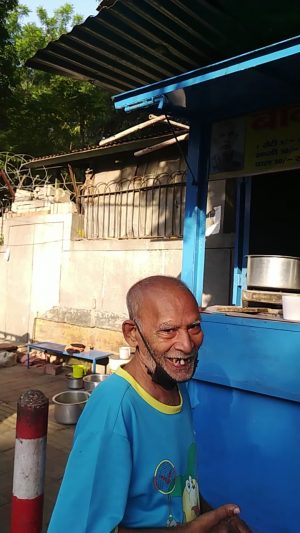Twitter — for many, this space has become a synonym to toxicity. Every morning, when you tap that little birdy icon on your smartphone, you are prepared to see an overload of opinions, and often, bigotry and prejudice.
A usual day on Indian Twitter starts with some aggressive hashtag, mostly political in nature, and ends with another, counter hashtag. The Twitter battle is always on between the supporters of the ruling Hindu-Nationalist Bharatiya Janata Party (BJP) and its opponents.
Who could have thought that this order of things on Twitter will be disrupted by a crying old man!
A video shared on the micro-blogging website a few days ago shows an elderly businessperson from India’s capital New Delhi.
Wearing a black mask down to his chin and a bright orange jersey of an international food-delivery brand, the old man is seen in tears. Next to him sits his elderly wife, with a resigned look on her face. The camera moves to matar paneer, a common North Indian dish, sitting idly in a vessel nearby.
The frame then shifts to the road and the person recording this video shows us the desolate blue eatery run by the old man, without any customers. All the while, the man shooting the video sympathetically tells the elderly owner of the shop to not lose hope.
The heart-breaking video has been viewed more than 3.5 million times on Twitter. In the offline world, hundreds have since lined up outside the eatery Baba Ka Dhaba to support the elderly couple, Kanta Prasad and Badami Devi.
The eatery is in Malviya Nagar, a middle class neighborhood in the south of Delhi.
The locality, which saw overwhelming support for the old man cutting across political lines following the video shared on Twitter, is less than 30 kilometers from northeast Delhi, the area that witnessed riots in February this year. During these riots 53 people were killed, most Muslims — including the 85-year-old Akbari Begum.
The Indian Twitterati response was divided on Twitter during the Delhi riots along expected partisan lines.
Tragedies and tribulations are regular for those living in India. Images of people breaking down seldom stir our emotions. Even if they ignite the fire of compassion in a few people, many ignore these tragedies, often due to their political beliefs.
When migrants were thrown in a crisis by an ill-timed nationwide COVID-19 lockdown, their images shared by a veteran actor were called “propaganda” by a leader of the ruling party; his loyal Twitter followers agreed.
At a time like this, in a deeply divided country, where attacks on Muslims and Dalits are being justified or outright negated by the Indian Right, the fact that an old man received the empathy of people across ideologies is unprecedented.
There is no spin given to his troubles, no unnecessary accusations made, no “whataboutery” — and that’s a miracle indeed.
People lined outside Baba Ka Dhaba, those not in Delhi urged others to visit, and no other questions were asked on Twitter. It became a beacon of hope, giving joy to the octogenarian.
This miracle is happening at a time when a malicious tweet was shared to raise doubts about the testimony of a rape victim.
Last month in Uttar Pradesh’s Hathras district, barely 200 kilometers from Delhi, four dominant caste men allegedly raped a 19-year old girl from the Dalit community. Reports say the perpetrators also cut the girl’s tongue. She succumbed to her injuries on September 29.
Twitter, as usual, became the arena for vitriol splashing. The BJP IT cell chief Amit Malviya (who has nothing to do with Malviya Nagar), jumped to negate the rape allegations in the case.
Malviya shared a clip of the rape victim on Twitter, revealing her identity. He tried to make a point based on the 48-second video that the victim complained of strangulation, not sexual assault. The girl, a week before her death, had recorded a statement in front of a magistrate stating that she was gang-raped.
The tweet can no longer be found after the National Commission of Women sent a notice to Malviya and others for revealing the identity of the rape victim.
It is difficult to comprehend that a platform where such immoral arguments are made can ever come together to bring a smile on someone’s face without an agenda behind it.
Kanta Prasad has unwittingly done what nobody else could — stir everyone’s conscience.
The constant war of words online often makes Twitter a harmful space for the mental health of its users. But as the former head of product at Pinterest, Tim Kendall, said in “The Social Dilemma,” a new Netflix documentary, we may not notice this now but online tools have contributed to good things as well. Kendall said, “They’ve reunited lost family members; they’ve found organ donors.”
And now, we can add that they have given Kanta Prasad and his family hope in these bleak times.
Sumaira Rizvi is a Delhi based independent journalist. She has written for Al Jazeera, The Print, and The Citizen among others.

































